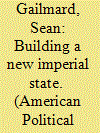| Srl | Item |
| 1 |
ID:
156697


|
|
|
|
|
| Summary/Abstract |
Separation of powers existed in the British Empire of North America long before the U.S. Constitution of 1789, yet little is known about the strategic foundations of this institutional choice. In this article, I argue that separation of powers helps an imperial crown mitigate an agency problem with its colonial governor. Governors may extract more rents from colonial settlers than the imperial crown prefers. This lowers the Crown’s rents and inhibits economic development by settlers. Separation of powers within colonies allows settlers to restrain the governor’s rent extraction. If returns to settler investment are moderately high, this restraint is necessary for colonial economic development and ultimately benefits the Crown. Historical evidence from the American colonies and the first British Empire is consistent with the model. This article highlights the role of agency problems as a distinct factor in New World institutional development, and in a sovereign’s incentives to create liberal institutions.
|
|
|
|
|
|
|
|
|
|
|
|
|
|
|
|
| 2 |
ID:
168524


|
|
|
|
|
| Summary/Abstract |
In the colonial period of American history, the British Crown reviewed, and sometimes nullified, acts of colonial assemblies for “repugnancy to the laws of England.” In this way, Crown review established external, legal constraints on American legislatures. I present a formal model to argue that Crown legislative review counteracted political pressure on imperial governors from colonial assemblies, to approve laws contrary to the empire’s interests. Optimal review in the model combines both legal and substantive considerations. This gives governors the strongest incentive to avoid royal reprisal by vetoing laws the Crown considered undesirable. Thus, review of legislation for consistency with higher law helped the Crown to grapple with agency problems in imperial governance, and ultimately achieve more (but still incomplete) centralized control over policy. I discuss the legacy of imperial legislative review for early American thinking about constitutional review of legislation by courts.
|
|
|
|
|
|
|
|
|
|
|
|
|
|
|
|
| 3 |
ID:
090799


|
|
|
|
|
| Publication |
2009.
|
| Summary/Abstract |
We argue that large elections may exhibit a moral bias (i.e., conditional on the distribution of preferences within the electorate, alternatives understood by voters to be morally superior are more likely to win in large elections than in small ones).This bias can result from ethical expressive preferences, which include a payoff voters obtain from taking an action they believe to be ethical. In large elections, pivot probability is small, so expressive preferences become more important relative to material self-interest.
|
|
|
|
|
|
|
|
|
|
|
|
|
|
|
|
| 4 |
ID:
168706


|
|
|